The Music For Spring 2013′s Anime Season – Thoughts Thus Far
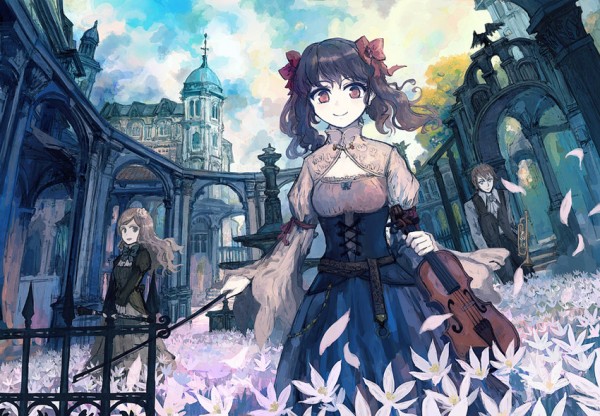 Introduction: The spring season is, once again, upon us, and for a group of anime music fans, that means out with the cold, out with our spell of Western cartoon music (maybe?), and in with warmer weather (in theory) that envelopes us, leaving us with much good cheer. While the last season turned out to be rather lacking, the spring roster sees the return of many big names like Mina Kubota, Hiroyuki Sawano, Akira Senju, and Yasuharu Takanashi doing something that’s not Fairy Tail or PreCure! There’s quite a bit to cover, so let’s get things under way.
Introduction: The spring season is, once again, upon us, and for a group of anime music fans, that means out with the cold, out with our spell of Western cartoon music (maybe?), and in with warmer weather (in theory) that envelopes us, leaving us with much good cheer. While the last season turned out to be rather lacking, the spring roster sees the return of many big names like Mina Kubota, Hiroyuki Sawano, Akira Senju, and Yasuharu Takanashi doing something that’s not Fairy Tail or PreCure! There’s quite a bit to cover, so let’s get things under way.
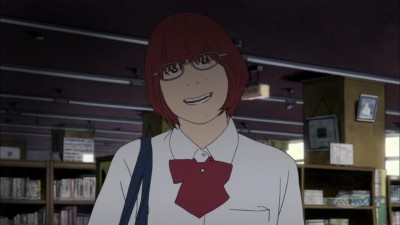 Aku no Hana
Aku no Hana
Composer: Hideyuki Fukasawa
Synopsis: Takao Kasuga is a bookworm who has a crush on his classmate, Nanako Saeki. He ends up stealing her gym uniform, which creates an interesting situation as Sawa Nakamura, an aloof girl with a creepy aura about her, uses this opportunity to blackmail him and force him into compromising situations.
Thoughts: With credits which include the recently-finished Vividred Operation and some video game work like Street Fighter IV, Hideyuki Fukasawa’s discography is untested at this stage of the game since the former had some exciting militaristic melodies (though without a soundtrack release until June, who knows how things will ultimately turn out) while the latter wasn’t too memorable. And when you look at the first couple episodes of Aku no Hana… well, there’s not a whole lot to go off of. There are some judicious uses of silence and some lonely solo piano music which only serve to create a tense atmosphere to fit with the show’s idiom and a really eerie piece towards the end. Aurally enhancive of the anime? Sure. But a melody or hook to make it more than just atmospheric stuff? Not here.
Photo Kano
Composer: Mina Kubota
Synopsis: Armed with his father’s old camera, the spineless Kazuya Maeda begins exploring photography at school and winds up getting recruited by the school’s Photography Club, a group of misfits whose photographic intentions are less than pure. Nevertheless, Kazuya proves to be a valuable asset, given his uncanny and inexplicable ability to bump into and attract many of the school’s hot girls to him.
Thoughts: I’m really sorry to see someone with the prowess of Mina Kubota, whose work on outstanding soundtracks like Kaleido Star and Kannazuki no Miko get saddled with such a project. For one, that effectively rules me out of following this series for more than one episode. For another, the music is actually quite good. Kubota conjures forth charming, soothing piano pieces to start things off before regaling us with her Celtic melodies that, together, create an aura that’s light and optimistic. Thank goodness then, that I can fetch the soundtrack later since this one looks like it’ll get a standalone release (for once!).
Dansai Bunri no Crime Edge
Composer: Yasuharu Takanashi
Synopsis: Kiri Haimura is obsessed with cutting hair and when he gets lost one day, he comes across a formidable foe in the form of Iwai Mushanokouji’s locks which cannot be cut by normal scissors. But as Kiri finds out, the scissors he packs are anything but normal as they effortlessly slice through Iwai’s hair, bringing her much happiness but also much darkness into the world.
Thoughts: It’s been awhile since I’ve heard a Takanishi score that isn’t Fairy Tail or PreCure and I’m glad for that. The music in Dansai Bunri no Crime Edge has been a mixed set of moods with the beginning of the episode packing a more light-hearted affair that’s whimsical and joyful with a smattering of regality about it. But as the story unfolds, Takanishi’s score descends into eerier fare, fitting, given the excellent work he did with Shiki’s soundtrack. With lonely piano solos building up some delicious tension (for what it’s worth, it’s some of the better tension-y pieces I’ve heard this year), followed by some strings to augment that loneliness further to set up for a dose of good ol’ heartfelt tragedy, I expect to see Takanashi deliver once more with a riveting score for a less-than-riveting (at least to me) anime.
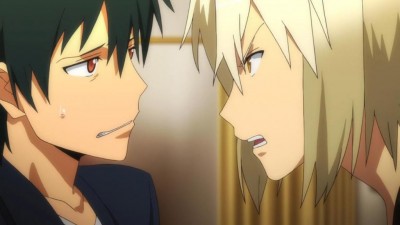 Hataraku Maou-sama!
Hataraku Maou-sama!
Composer: Ryosuke Nakanishi
Synopsis: After being defeated by the Hero in the battle for Ente Isla, the Demon Lord Satan takes refuge in modern-day Japan along with his faithful general Alsiel. Unfortunately, magic is near-non-existent in this world and so, the two must find some way to restore their powers. Until then, to make ends meet, Satan finds himself working judiciously as a crew member at a local fast food joint while Alsiel snoops around in the library to research how to work magic in this strange new land. Little did they know that the Hero followed them to Japan and hilarity ensues when they encounter each other.
Thoughts: Ryosuke Nakanishi’s anime credits are pretty thin on the whole and even if the start of the first episode has promising fare like dark, ominous tracks that hang overhead with its ponderous choral sections, nothing else really sticks out from the drone of urban indifference. The pieces that play during the comedic sections are less than enthralling, which isn’t a bad thing, but when I stick to this series (which I will), it’ll most certainly be for the amusement value and not for the music.
Devil Survivor 2
Composer: Kotaro Nakagawa
Synopsis: Daichi Shijima persuades his friend Hibiki Kuze to try out a new mobile app called Nicaea, which shows faces of people who are about to die. Sure enough, both boys’ faces are shown as being the next victims and sure enough that comes true when a subway derails and falls on top of them. But somehow, the app gives them a second chance at life, and they awake to find that the world is now under attack by demons but that they too can summon demons to defend themselves and the world around them.
Thoughts: This is a bit of a strange turn for Kotaro Nakagawa, whom I associate more with themes that approach grandness and less so on some of the funkier synth that’s on display here. As the episode progresses, he delivers with some tragic-sounding piano music, but once the action comes up, you get some harsh, rhythmic electric guitar tracks that do carry a current of energy, but lack the finesse of something you’d expect out of someone who composed Code Geass’s score. Not that it matters anyway, since I won’t be seeing this show through anyway, but if the soundtrack manages to be good, I may give it a whirl.
Ginga Kikoutai Majestic Prince
Composer: Toshiyuki Watanabe
Synopsis: Team Rabbit is widely considered to be the lowest performing group at the academy city of Gurantseere, not surprising when it’s made up of Izuru, a starry-eyed idealist, Toshikazu, a rough guy known for getting stage fright, Tamaki, a girl who focuses on love at the expense of nearly everything else, Kei, the serious type, and Ataru, the gun freak. Nevertheless, they get called out on a sortie to rescue a moon colony and succeed beyond all expectations.
Thoughts: Toshiyuki Watanabe is someone I’ve been keeping an ear on, especially given the excellence he’s shown in his score for Space Brothers. And so far, I’ve been pleased with his efforts on Majestic Prince. This anime’s music keeps with the sort of high-minded militaristic themes along with some small ensembles that deliver upon more whimsical fare from time to time to vary things up a bit. Not surprisingly, it’s the majestic tunes that rule the day and the only real worry I have is that it’ll degenerate to become generic space battle orchestral music that won’t stand out in any meaningful way. But so far, the music is sweeping and awesome in its scope and the story piques my curiosity just enough for me to see it through for just a bit longer.
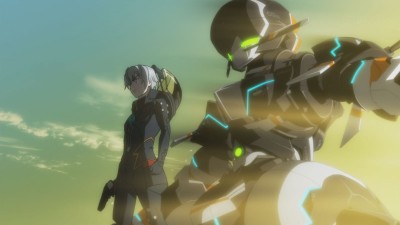 Suisei no Gargantia
Suisei no Gargantia
Composer: Taro Iwashiro
Synopsis: In a last-ditch effort to defeat a marauding alien species known as the Hideauze, the Galactic Alliance of Humankind sends a barrage of soldiers piloting mecha units to destroy the enemy superweapon. After the attack fails, Humankind’s troops are forced to flee and as Red, a 16-year old pilot attempts to go through the closing wormhole, he’s attacked, narrowly escapes, but loses consciousness. When he awakens, he finds himself surrounded by a primitive group of humans and learns from his mecha’s AI unit that he may very well be on Earth.
Thoughts: Without a doubt, Taro Iwashiro’s soundtrack for Suisei no Gargantia is the best musical offering out of Spring 2013’s anime by a long shot. It’s hard to turn away from something so stirring as the strings draw us into the story and carry an aura that suggests that an epic tale is about to unfold. With credits to his name including the Red Cliff movies and the Fullmetal Alchemist Sacred Star of Milos movie, you really can’t go wrong. With all that Iwashiro is serving up, I can’t help but be swept into the story as the music and the anime work in tandem to bring forth an epic adventure!
Valvrave the Liberator
Composer: Akira Senju
Synopsis: Up until now, Haruto Tokishima had been living a normal high school life where he engages in eating contests with his friend Shoko, a girl whom he’s had a crush on for a while now. As he’s about to confess to Shoko, the militaristic Dorssian Federation attacks his city and lays waste to the school. A stray shot winds up nearly killing Shoko and, enraged, Haruto climbs on board an experimental mecha unit that somehow managed to reach the surface to kill the invaders. In the process, Haruto inadvertently turns into a zombie. Yes, you read that last part right.
Thoughts: Akira Senju is known for composing one really awesome theme and then decent-ish everything else (see his Fullmetal Alchemist: Brotherhood soundtrack), with <em>Red Garden’s soundtrack being a notable exception. Still, they work well within the context of the work and his work on Valvrave is no exception. The series starts off on a dark and dramatic note which fits Senju’s tendencies to a T. Then, things take a slight turn to the whimsical during the eating contest, but once battle rages, the tragic-sounding themes rear their head and, given Senju’s inability to compose hot-blooded action music, we settle for funereal dirges, which nevertheless suit the scenes extremely well. I’m not sure whether the show will deliver in terms of plot, but the music is sterling and with Senju’s pedigree, you really can’t go wrong here.
RDG Red Data Girl
Composer: Hikaru Nanase (Masumi Ito) myu
Synopsis: Izumiko Suzuhara lives with her grandparents at a shrine while her parents are away in the city. A shy girl, she has this strange ability where she cannot interact with electronics without breaking them in some way, exemplified when she causes a blackout at school after fiddling with some computers. At that moment, Yukimasa Sagara, a monk, comes to pick her up. With him is Miyuki, a boy Izumiko’s age who is assigned to be her guardian. Though at first they don’t get along, tensions ease somewhat when Izumiko’s role in the world is revealed.
Thoughts: I’m not sure what to expect out of part of the score for Red Data Girl given my lack of familiarity myu’s music, but Hikaru Nanase is a name that’s relatively near and dear, though I’ve yet to see her deliver anything on the scale of the beautiful Bungaku Shoujo soundtrack. But if there’s anything that’s looking like it’s coming close to that, so far Red Data Girl looks to be it seeing how it’s coming along pretty nicely. The early slice of life pieces consist of nice, pleasant orchestrals that take a calm and mellow tack, but once Izumiko begins communicating with her father, the melodies take a more threatening turn that border on the tragic, especially when that violin solo comes in. There are a few moments of sheer tension in the second episode too and the music rises up to the occasion without being overbearing. Beyond that, the rustic music comes off as quaint and charming, tinged with a mystical edge to capture our senses and fill it with the hope that Izumiko will be able to reconcile herself with her newfound role.
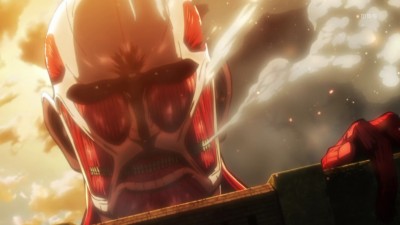 Attack on Titan or Shingeki no Kyojin
Attack on Titan or Shingeki no Kyojin
Composer: Hiroyuki Sawano
Synopsis: Mankind faces a threat in the form of giant grotesque humanoids called Titans who feast on humans. To safeguard humanity from these creatures, people have constructed cities guarded by tall, thick walls. That has worked for over 100 years, but now, the Titans have renewed their assault on humanity and in their invasion, changes the lives of Eren Yeager, Mikasa Ackerman, and Armin Arlart forever.
Thoughts: I’m not sure whether it’s because the series has just started and there’s not much to show off just yet or what, but so far, we haven’t heard much from the music. Known for bombastic stuff like his score for Guilty Crown and Gundam Unicorn, Hiroyuki Sawano seems to be keeping a rather low profile, dispensing with generic action music for the most part while keeping silent everywhere else. That said, when Sawano puts his mind to it, the music can be extremely impactful such as in the part where the chorus and strings sound out during the Titan invasion. There, the music enhanced the grotesqueness of the creatures while filling viewers with chest-tightening fear, effective when it comes to making the experience all the more visceral. Hopefully we’ll see more of that as the anime continues and that this isn’t just an awesome first impression that’ll falter down the line.
Miscellany: Once again, quite a few anime got left off our list, mostly because this list is already full as it is and I think we’ve hit most of the high points anyway. I wasn’t ready to sit through Arata Kangatari just to see what Kow Otani is serving up since he’s kind of a hit or miss anyway and it’s going to take much from Shiro Hamaguchi for me to sit through Karneval’s plot. Sequels like Ore no Imouto carry with them composers who are effectively known quantities and… ehhh… I just can’t bring myself to care about what Satoru Kousaki and Monaca compose outside of J-pop. Sad, I know.
On the bright side, this does bring our Western cartoon shenanigans to an end, so there’s that to celebrate, I guess! (For those who didn’t look to see what we did last year, SHAME ON YOU! ;D )

I’m curious about how you guys feel about the Aku no Hana ED. It seems to be fairly polarizing. I for one love it. I think it is distinctive, and fits the mood of creepy awkwardness that is somehow still compelling that the show itself is doing such a good job of generating.
As to the BGM for the various shows, I find it difficult to evaluate this as the show goes on. I am always surprised when I listen to OSTs to find out what the show I watched “really” sounded like.
@Joojoobees
Oh man, yeah… that ED. My stance: it’s pretty grating, what with the discordant tones kicking in to make you feel really really uncomfortable. Definitely a great way for the show to end because of the way things go in the anime, creepiness is probably exactly what they’re aiming for and you’re not going to forget that effect after each episode with an ED like that.
As far as BGM goes, some are a hit or miss. Maybe it’s time for me to compile a “sounds great in the anime but crappy on their own” list. List posts are popular, so I hear!
Haha, yes! I was reading the review and I was disappointed but then I thought “well I guess they are reviewing music, not sounds.” I can’t get over the use of sound in that show. It creates this incredible and intense sensory experience which really enhances the show and everything it’s about. I’ve never experienced anything like it before. It gets me really excited, if you can’t tell.
@loveandsausages
That show is so creepy that it can be uncomfortable to watch. That whole discomforting thing is why it’s so enjoyable though and though I hesitate to watch it week in, week out, I usually don’t regret doing so.
It’s strange that they would hire someone like Hideyuki Fukasawa and then ask him to write not a soundtrack, but a soundscape. It seems like a waste. Still, the show does have excellent atmosphere so he certainly played his part well.
My favorite this season is probably Majestic Prince. It’s grand, fun, memorable. Space Brothers was just a warm up. If you look at Watanabe’s history you’ll see he’s has quite a bit of experience with the mecha/space genre so you can likely expect this score to stay at this quality. Hopefully they release the soundtrack soon. By the way, you should check out his Space Brothers orchestral medley that came out recently – it’s great.
Oh and I’d like to point out that RDG isn’t only by Masumi Ito (who is using her real name strangely). It is also being composer by myu, who previously scored Utawarerumono and Legend of the Legendary Heroes.
@random
Yeah, I’m not quite sure why they’d pick him seeing that he did a decent job with Vividred, at least, from the little I’ve seen of it. I’ll have better knowledge once the enclosed soundtrack comes out, but for now, Aku no Hana’s creepy atmosphere gets a heap of assistance from the music and makes for good viewing overall.
Thanks for the correction on RDG and I’ve updated the entry to reflect it. Also, do you happen to have a link to the Space Bros medley?
Well now you’ve made it so it’s only myu. It’s by both of them. That’s all I was trying to say.
Check Nyaa for the medley.
@random
2aefawawernkchse arg, OK, it should be fixed now. And thanks for pointing me in that direction! Loving what I’m hearing so far.
Shame on me. That’s what I get for being such a drama queen. But who would remember to look at what you did for last year’s April Fools?
I’ve no idea why people are making such a fuss about Suisei no Gargantia. I didn’t find either the story or the music particularly captivating, and it’s actually more generic to me than people say Majestic Prince is, even though my favourite musician did the opening song. (I didn’t drop it yet, waiting for something exciting to happen).
My choice regarding music this season would probably be Devil Survivor 2, closely tied up with Shingeki no Kyojin. And, it’s too bad Hataraku Maou-sama didn’t get that good of a soundtrack, as it would definitely boost the great entertainment value it already has.
@Yuki Nagato
Let’s say I’ve had quite a few zealous readers in the past who’ve scoured this site for everything it’s worth and are aware of our idiosyncrasies 😉
In terms of Suisei no Gargantia, I’d say the story is a bit of a unique take since I can’t recall the last time I’ve encountered a lone-survivor in a crowd of strangers scenario portrayed in a manner that’s fairly realistic, from the interactions with the local populace to the bit of diplomacy that goes on given that the newcomer, Red, throws the balance of power in the world out of whack. It’s fascinating for me since I’ve enjoyed reading up on power and politics as I dabbled in political science. As for the music, those strings and the way they just churn up that sense of epicness. If the soundtrack comes out, I’ll be reviewing it for sure!
Devil Survivor more or less gets a 1-episode pass from me since I’m sure it’s not going to be my kind of thing, so I’ll just kind of keep it to that and give the OST a go only if people start praising it. As for Kyojin, yeah, it’s Sawano, and I’m curious what he’s going to deliver on. He seems to be keeping the musical cards close to his chest so far though.
Nice reviews! It’s great to see Akira Senju getting some attention. He’s a really nice guy, too. Have you heard his score for Princess Arete?
Something you might not know about how TV anime works: the music is written in advance of the show, like a pre-order, and in fact it’s a “music chooser” (often translated to music editor, but literally a 選曲, senkyoku), who actually decides what music goes where. So when you’re judging a TV show’s score, it’s not just the composer’s decisions you hear. If you’re curious about music in anime, you could check out the book Drawn to Sound, which has a handful of essays about anime—some of the first serious research in English on the topic.
@Alexandra
Akira Senju always warrants attention, not a surprise given how much I adore Red Garden’s soundtrack. FMA:B, not so much, but I can say that Arete Hime is one of his better ones. Especially that song with Origa that is just so beautiful!
Anyway, yes, I am somewhat aware of how the process works after listening in on an interview with the Choro Club (who scored the glorious ARIA soundtracks) in that the director usually gives them moods to shoot for and they try to compose within those guidelines. Sometimes things go really well (ARIA) and sometimes, you get people like Taku Iwasaki griping about how terrible his music was used (like in the new JoJo’s Bizarre Adventure). Really fascinating stuff and I’ll definitely check that book out since it’s right up my alley.
Pingback:Flowers of Evil ep5: refreshing? Not so much. | the Check-in Station
Just a correction, Hideyuki Fukasawa didn’t work on Street Fighter II, that was mostly the work of the legendary Yoko Shimomura who went on to work for Squaresoft, she freelances now but her current project is Final Fantasy XIII Versus which many people expect to get rebadged as Final Fantasy XV for PS4 @ E3.
Hideyuki Fukasawa is the current go to guy for Capcom when it comes to fighting games though, having worked on Street Figther IV, Marvel Vs Capcom 3, Street Fighter X Tekken as well as their revisions.
He seems to want to get into the anime business though since he’s had a hand in a title per season so far this year with Vividred and Aku Hana.
@Westlo
Thanks for that tidbit. Corrected. Seems like another trend of composers from the VGM realm coming in to work on anime, granted, he’s had a couple anime credits to his name. Most of them seem to be obscure/off the beaten path though.